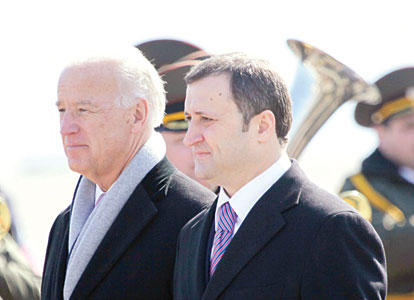
Vice-President Biden’s Visit Can Reanimate US-Moldova Relations (Part One)
Publication: Eurasia Daily Monitor Volume: 8 Issue: 51
By:

US Vice-President, Joseph Biden, paid a seven-hour flag-showing visit to Chisinau on March 11, on his return trip from Moscow to Washington. With this, Biden became the highest-ranking US official ever to visit Moldova during 20 years of the country’s independence. Previous high-level visitors were then-Secretary of State, James Baker, in 1992 (also on a stopover of several hours) and then-Defense Secretary, Donald Rumsfeld, in 2004. The last US Congressmen to have visited Moldova were Curt Weldon and Dennis Kuchinich in 1999 –hardly the most edifying pair that Congress could have mustered.
US policy toward Moldova has been replete with good intentions poorly executed, periodical gestures without continuity, and few deliverables beyond generous US economic assistance (both bilaterally and through the International Monetary Fund). Moldova is also the recipient of a $262 million grant from the US Millennium Challenge Account program, negotiated with the nominally communist government in 2008-2009, and signed with the new government in January 2010, for disbursement over a five-year period (Moldpres, March 11, 2011).
Politically and strategically, US deliverables have proven scant thus far. US President George W. Bush’s December 2002 meeting with Moldova’s nominally communist president, Vladimir Voronin, in Washington was a one-off gesture, promptly forgotten on both sides. The thinking behind that invitation was never made clear, but it seemed related to the short-lived, joint Russian-US push to solve the Transnistria conflict by “federalizing” Moldova (“Vice-President Joe Biden Shows US Flag in Moldova,” EDM, March 16), which failed. Rumsfeld’s June 2004 Moldova visit brought the most significant US deliverable to date. His personal impact on Moldova’s president was such that Voronin promptly flew to NATO’s Istanbul summit and asked NATO to contribute to a solution of the Transnistria conflict. NATO, however, had already at that point recued itself from any peacekeeping role in its own immediate neighborhood; and this episode also remained without follow-up in US-Moldova relations.
US diplomats have held the post of Organization for Security and Cooperation in Europe (OSCE) Mission Chief in Moldova continuously from 1996 to date (presumably necessitating some US political capital to be spent at the OSCE for maintaining this arrangement). Moldova always pleaded strongly (and does do again at the present moment) for this post to remain in US hands, although some of those hands could have been selected from among more capable ones.
A nadir was reached in 2002-2003, when State Department officials and the American-led OSCE Mission in Chisinau campaigned for a Russian proposal to turn Moldova into a Moldova-Transnistria “federation.” Transnistria’s Moscow-installed authorities were co-authoring the constitution of a “federalized” Moldova in OSCE-mediated negotiations; Russia had the status of a post-settlement “guarantor,” excluding Western participation (Russia continues at present to claim that “guarantor” status); and there was no provision for withdrawal of the Russian troops. At the OSCE’s 2002 year-end conference, senior State Department officials pressured Moldova to accept Russian-proposed changes to Russia’s 1999 troop-withdrawal commitments. The changes turned Russia’s obligation to withdraw the troops, into a mere “intention” to withdraw them; extended the time-frame for this; and introduced a previously nonexistent conditionality to troop-withdrawal, “provided the necessary conditions are in place,” unspecified, and giving
Russia an excuse to keep its troops in place. The Moldovan delegation complied after the senior US diplomats threatened to cancel Voronin’s Washington visit and otherwise to withdraw support.
Given the infrequent nature of US-Moldovan interactions at high levels, those events left enduring scars. At present, Chisinau hopes that the US will insist on observance of the “host-country-consent” requirement, not only on paper but practically, in the ongoing US-Russia talks on conventional arms control in Europe. Thus, Russia’s military presence in Moldova cannot be excused on the basis that those troops “guard dangerous munitions” or that they are “peacekeepers.” Moldova never gave its consent to the stationing of Russian troops. However, US and European partners for all these years cautioned Moldova (as well as Georgia) against exercising the right to call for withdrawal of Russian “peacekeeping” troops. While arguing persuasively that such a call would remain unheeded, and risked destabilizing the situation in any case, the same Western partners never seriously addressed this issue in their negotiations with Russia.
As a net result, the host-country-consent principle was never implemented in Moldova (or in Georgia), but its breach has simply not been acknowledged. The US and NATO have tacitly and reluctantly accepted a Russian “peacekeeping” monopoly in former Soviet-ruled countries. Following the results in Georgia of Russian “peacekeeping,” Moldova is the remaining case of host-country-consent being honored in the breach. Ongoing US efforts to resuscitate the Treaty on Conventional Forces in Europe (CFE) offer one of several chances to rehabilitate the host-country-consent principle, and implement it in practice.




